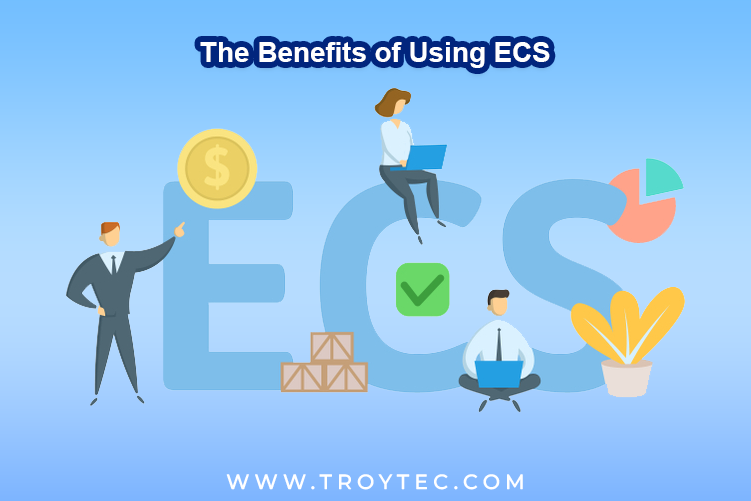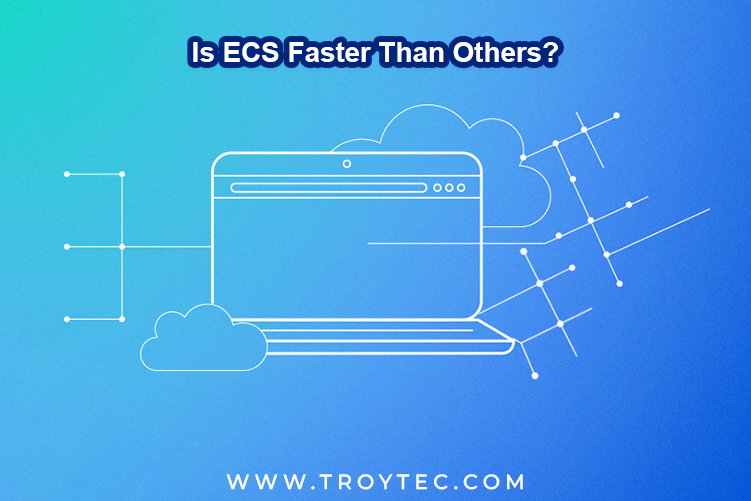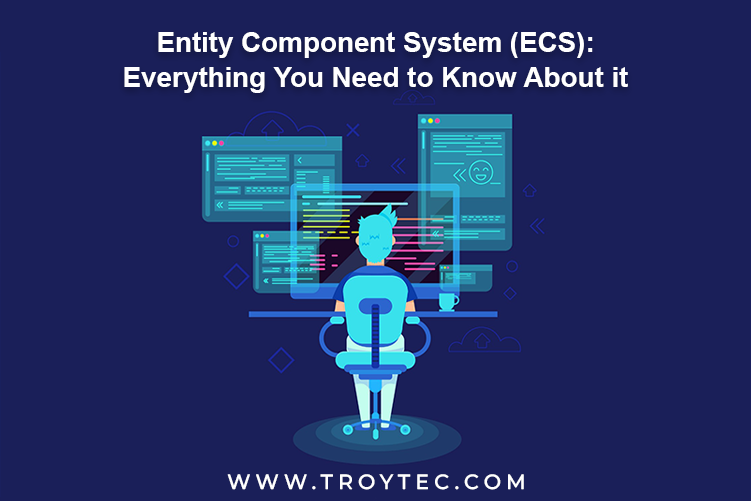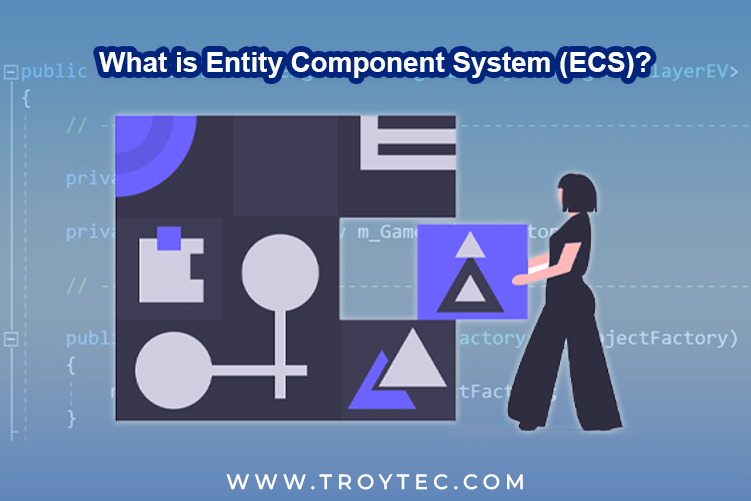Entity Component System (ECS): Everything to Must Learn About It:
No one in the world has ever played a single video game. Video games are a beautiful part of everyone’s childhood. Everyone loves to play video games from their childhood to elder age. It has become a fantastic party of life. However, video games are a serious business now a day. If you have, you can ask anyone who designs or plays them. Behind video games, there is a lot of struggle that goes into developing these games, counting plenty of utilities, coding, and architecture. That is why ECS or Entity Component System is one of the hottest topics when discussing video games. The ECS is an architectural pattern used mainly in video game development.
There’re limited but elementary and compassionate principles hiding in the somewhat clumpy name ECS or Entity Component System. These assist us in getting rid of typical pains we’ve faced with OOP (Object Oriented Programming) or similar paradigms. For instance, ECS helps us distinguish our app data from the logic programming and prefer simple composition over inheritance.
We’ll discuss some amazing facts about Entity Component System (ECS) and everything you must need to know about it if you want to become a video game developer. Keep reading the article to learn more amazing facts about ECS.
What is Entity Component System (ECS)?
The ECS or Entity Component System is an architectural pattern primarily used in game development. It expedites code reusability by unraveling the critical data from the behavior. Moreover, an entity-component system (ECS) complies with the principle called “composition over inheritance,” given that improved suppleness and assists game developers’ identity entities in a video game scene where almost all the coding objects are categorized as entities. Frameworks sometimes empower ECS, and the term “ECS” is repeatedly used to exemplify a unique design pattern implementation.
An ECS architecture splits identity (entities), essential data (components), and architectural behavior (systems). The architecture centers around the information. Frameworks change the information from an info state to a resulting state by perusing floods of part information listed by elements.
An entity-component system (ECS) contains the following components:
- ECS has unique identifiers called ‘Entities.’
- ECS comprises basic datatypes deprived of behavior called ‘Component.’
- ECS has systems, explained as functions that are matched with unique entities that contain a particular set of components.
- Entities may comprise zero or more components.
- Entities can enthusiastically change components.
- Therefore, an ECS or entity component system is an architecture that emphasizes data and separates components, entities, and systems.
However, these characteristics make it a supernatural fit for a video game design. Now, we’ll explain the term ECS in separate parts to identify them better.
What is Entity?
An entity addresses one “thing” in a computer game, a particular item addressing an entertainer in a reproduced space, regularly communicated as a one-of-a-kind number worth. For instance, assuming you’re playing Skyrim, all the unmistakable, noticeable “things” in the game’s universe are substances. They contain no accurate information or ways of behaving. An entity addresses a broadly valuable item. For instance, each coarse game item is a substance in a game motor setting. Ordinarily, it just comprises a unique id. Executions ordinarily utilize a plain number for this.
What is a Component?
A component is a data type consisting of an exclusive behavior assigned to an entity. Some features are reusable modules that developers or programmers attach to the unique entities, provided that behavior, appearance, and functionality, form an entity. A part usually names an entity with a specific perspective and holds the information expected to show that viewpoint. For instance, each game item that can take harm could have a Health part connected with its substance. Executions usually use structures, classes, or acquainted exhibits.
To better understand what a component is, let’s take an example of a sorcery and sword game programmer who can build a magic sword entity by conjoining the following elements:
- A materialistic component, like ‘shininess,’ which influences the sword’s appearance
- A weighty piece that measured in ‘pound’ to conclude the magic sword’s overall weight
- A damaged part that stimulates how practical a weapon (the sword) is
What is a System?
A system restates different components to perform some low-level functions such as performing mathematical calculations, physics calculations, or rendering graphics. Frameworks give a worldwide extension, administrations, and the board for part classes. Essentially the rationale works on the parts. A system is a cycle that follows up on all elements with the ideal components. For instance, a physical science framework might question elements having mass, speed, and position parts and emphasize the outcomes doing physical science estimations on the arrangements of features for every substance.
The way of behaving of an entity can be changed at runtime by frameworks that add, eliminate or alter parts. It kills the vagueness issues of profound and expansive legacy progressive systems frequently found in Object Oriented Programming methods that are hard to comprehend, keep up with, and expand. Normal ECS (Entity Component System) approaches are profoundly viable and are frequently joined with information situated plan strategies. Data for all occasions of a part is ordinarily put together in actual memory, empowering adequate memory access for frameworks that work over numerous entities.
The Benefits of Using ECS

Here are some benefits of using ECS for programmers:
- Game developers can utilize ECS to develop small and less complex code
- Using ECS is an easy choice for unit mocking and testing
- ECS empowers no-techies to script using behavior
- ECS offers a clean and clear code design that employs reusability, encapsulation, and modularization methods
- ECS lets game developers or programmers mix ecological or reusable parts, which gives better flexibility when they define various objects
- ECS assists programmers in separating essential data from the different functions that can act on it
It assists you in bolstering or adding new unique features
- ECS offers a fantastic architecture for both VR (Virtual Reality) and 3-D development, empowering you to develop the final app in terms of difficulty
- ECS features quite flexible nascent behavior
- Programmers can switch different components with ridiculed components at run time.
- ECS is a user-friendly method for parallel processing and multi-threading
The Pitfalls of Using ECS
Although there are many benefits of using an entity component system (ECS), there are also a few drawbacks to it for the game developers.
We all know that every tool is not perfect. They also have some downside. Here are some pitfalls of using ECS:
- Entity Component System ECS is still not well-known among programmers. Most programmers or people haven’t even heard of this word. (That is the main reason behind writing this article to let the people know about amazing facts about ECS who don’t know about them.) That can result in problems in collaboration with other game developers or programmers.
- ECS is not concretely demarcated as other patterns, such as MVC (Model-View-Controller).
- It is pretty challenging to apply ECS correctly. Moreover, it is also accessible to misuse. As a result, game developers or programmers have to think about how to develop or design better components.
- It needs programmers to write minimal systems that can hypothetically utilize in many entities. As a result, this method results in a high risk of writing ineffective code.
What makes ECS Differ from OOP?
Some entry-level programmers consider ECS (Entity Component System) as an alternative to OOP (Object Oriented Programming).
However, they have some differences, even though the two share a few overlapping similarities. These differences are as follows:
- OOP inspires or encourages data encapsulation while ECS encourages exposed POD (Plain Old Data) objects
- OOP deliberates inheritance as a first-class civilian. Instead, ECS meditates on composition as a first-class only
- OOP (Object Oriented Programming) collocates different data with behavior, while on the other hand, ECS separates the data from behavior
- OOP object’s occasions are single static, and the entities can vigorously change various components
- ECS and OOP are just two of the numerous ways we as game designers follow to have a strong groundwork and approach to laying our code.
Consider these standards we should completely comprehend and live by to have a smooth, stable, and severe life. Maybe a more proper term for it to look at is the word way of life.
Presently, these two have alternate ideas and models, so utilizing them simultaneously, similar to a crossover utilization, isn’t guaranteed to be wrong; however, it can prompt broken, chaotic ways of behaving and so forth because of the intricacies of both will add together. There are situations where ECS would be a superior fit to use, while there are cases befitting OOP too.
Is ECS Faster Than Others?
Generally speaking, even though it relies upon what’s being estimated and the ECS (Entity Component System) execution itself because various undertakings bring about multiple tradeoffs. Along these lines, for instance, an activity delayed in one system could be rapid in another.

Regarding speed, ECS (Entity Component System) executions are ordinarily great at powerfully changing parts at runtime and straightly questioning and repeating element sets. Then again, ECS executions miss the mark in speed while executing questions or tasks that need exceptionally particular information structures like spatial designs and twofold trees. Besides, you can capitalize on your ECS (Entity Component System), assuming you know more about the execution’s tradeoffs and influence its plan.
Data Flow in ECS (Entity Component System)
We may break down the ECS (Entity Component System) data flow into the below steps:
- Systems: The ECS system listens to the outside events and circulates updates to the part.
- Component: The ECS components listen to system events and then update their current state.
- Entity: The ECS entity collects behavior by the changes in the component states.
The player input framework distinguishes the gamer’s critical press and updates the movement part. The movement framework actuates and “sees” that the element’s movement is to one side, so it applies the Physics force likewise. Then, the rendering framework dominates and peruses the element’s ongoing position, attracting it as per its new spatial definition. Thus, a gamer presses the “right bolt” key while adventuring in a dreamland.
Conclusion
ECS (Entity Component System) is an architectural pattern. It is faster and better than OOP (Object Oriented Programming) in video game development. An entity is a separate object demonstrating an actor is a simulated space. You can utilize the ECS pattern to develop small and less complicated code. If you’re a game developer or going to jump into a game development career, ECS would be the best choice to understand and get started with it. Do you still have any questions left about ECS? Are you still finding it difficult to understand what ECS is? Comment below and ask your queries and get answers from our professional team!


